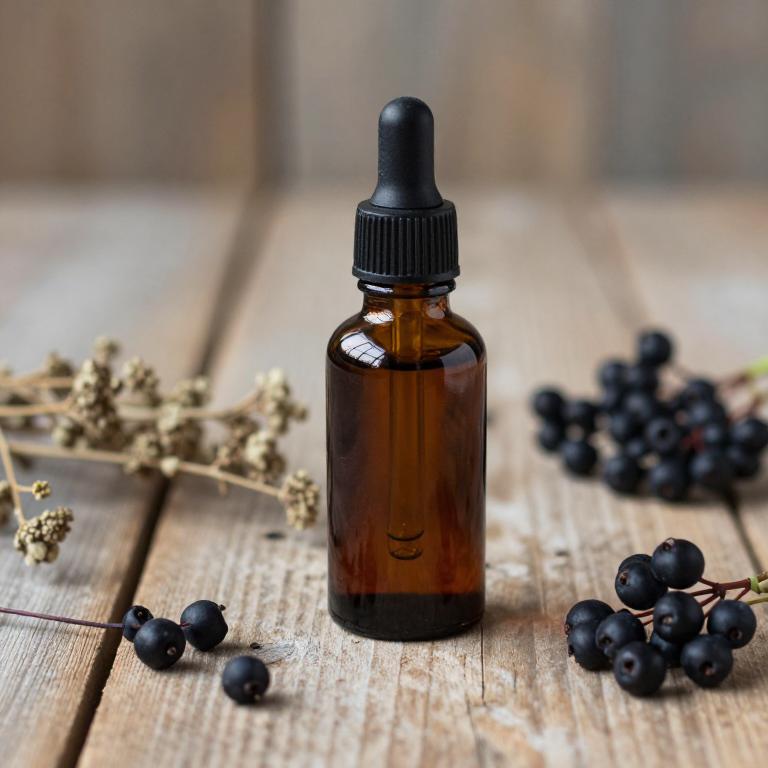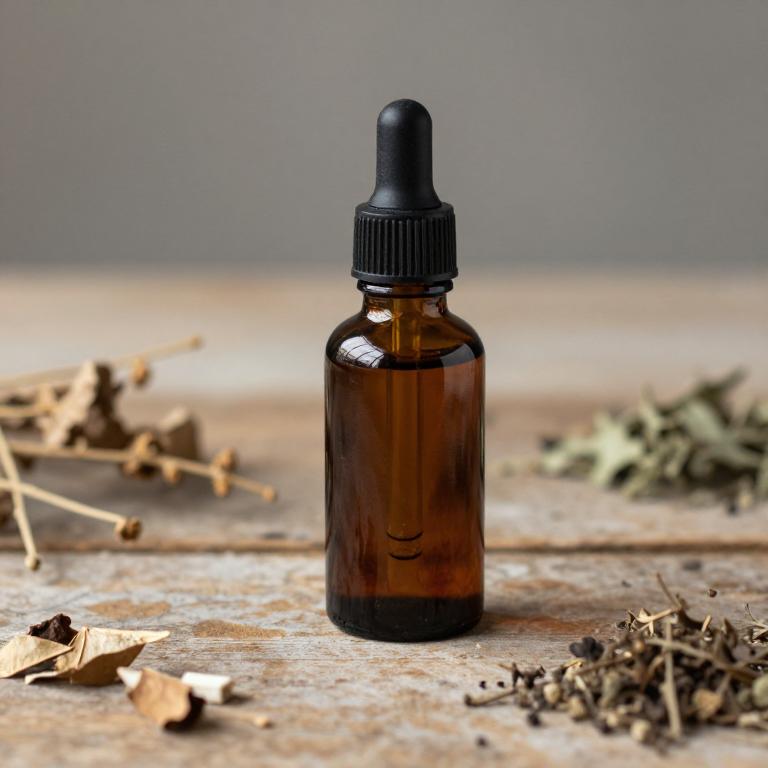10 Best Herbal Tinctures For Sore Throat

Herbal tinctures are concentrated liquid extracts made from various medicinal plants, commonly used to alleviate symptoms of a sore throat.
These tinctures often contain ingredients such as echinacea, sage, thyme, and licorice root, which are known for their antimicrobial and anti-inflammatory properties. They work by soothing the throat lining, reducing irritation, and fighting off infections that may contribute to soreness. Many people prefer tinctures over traditional remedies because they are easy to use and can be customized to suit individual needs.
However, it is important to consult with a healthcare professional before using herbal tinctures, especially for prolonged periods or in combination with other medications.
Table of Contents
- 1. Echinacea (Echinacea purpurea)
- 2. Licorice (Glycyrrhiza glabra)
- 3. Ginger (Zingiber officinale)
- 4. Black elderberry (Sambucus nigra)
- 5. Chaste tree (Vitex agnus-castus)
- 6. Salvia (Salvia officinalis)
- 7. Thyme (Thymus vulgaris)
- 8. Peppermint (Mentha piperita)
- 9. Goldenseal (Hydrastis canadensis)
- 10. Stinging nettle (Urtica dioica)
1. Echinacea (Echinacea purpurea)

Echinacea purpurea herbal tinctures are commonly used to support immune function and may help alleviate symptoms of sore throat by reducing inflammation and fighting viral infections.
These tinctures are typically made by soaking the dried roots and flowers of the echinacea plant in alcohol, which helps extract its active compounds such as alkamides, caffeic acid derivatives, and polysaccharides. While some studies suggest echinacea may shorten the duration of colds, its effectiveness for sore throat specifically remains inconclusive, though many people find it beneficial for its soothing and antimicrobial properties. When using echinacea tinctures, it is important to follow recommended dosages and consult with a healthcare provider, especially for those with allergies or on other medications.
Overall, echinacea purpurea tinctures can be a natural complement to conventional sore throat remedies, but they should not replace professional medical advice.
2. Licorice (Glycyrrhiza glabra)

Glycyrrhiza glabra, commonly known as licorice root, has been traditionally used for its soothing properties, making it a popular ingredient in herbal tinctures for sore throat relief.
The tinctures are typically prepared by extracting the active compounds from the root through alcohol, which helps preserve the therapeutic components. Licorice root contains glycyrrhizin, a compound with anti-inflammatory and antiviral properties that can help reduce throat irritation and combat infections. These tinctures are often used as a natural alternative to conventional sore throat remedies, offering a mild and gentle approach to symptom management.
However, long-term use should be monitored due to potential side effects related to the high glycyrrhizin content.
3. Ginger (Zingiber officinale)

Zingiber officinale, commonly known as ginger, has been traditionally used for its therapeutic properties, including its ability to alleviate sore throat symptoms.
Ginger herbal tinctures are concentrated liquid extracts made by soaking the dried root in alcohol or another solvent, preserving its active compounds such as gingerol and shogaol. These tinctures are valued for their anti-inflammatory, antimicrobial, and analgesic properties, which can help reduce throat irritation and discomfort. When used as a gargle or diluted in water, ginger tinctures may provide soothing relief and support the body's natural healing process.
However, it is important to consult with a healthcare provider before using ginger tinctures, especially for prolonged periods or in conjunction with other medications.
4. Black elderberry (Sambucus nigra)

Sambucus nigra, also known as European elderberry, has been traditionally used for its potential therapeutic properties, including its use in herbal tinctures for sore throat relief.
The tinctures are typically prepared by soaking the dried berries in alcohol to extract their active compounds, such as flavonoids and anthocyanins, which are believed to have anti-inflammatory and antioxidant effects. These properties may help reduce throat irritation and inflammation, making the tinctures a popular natural remedy for sore throat symptoms. However, it is important to consult with a healthcare provider before use, especially for individuals with allergies or those taking medications.
While some studies suggest potential benefits, more research is needed to fully confirm the efficacy and safety of sambucus nigra tinctures for sore throat.
5. Chaste tree (Vitex agnus-castus)

Vitex agnus-castus, commonly known as chaste tree, has been traditionally used in herbal medicine for its potential soothing and anti-inflammatory properties.
Herbal tinctures made from Vitex agnus-castus are often used to support the immune system and may help alleviate symptoms of sore throat by reducing inflammation and irritation in the throat lining. While not a direct treatment for infections, these tinctures may provide relief by promoting overall respiratory health and reducing discomfort. They are typically taken in small doses and are often combined with other herbs to enhance their effectiveness.
However, it is important to consult with a healthcare professional before using Vitex agnus-castus tinctures, especially for prolonged periods or in conjunction with other medications.
6. Salvia (Salvia officinalis)

Salvia officinalis, commonly known as sage, has been traditionally used for its soothing properties, and its herbal tinctures are often employed to alleviate symptoms of sore throat.
These tinctures are typically made by steeping dried sage leaves in alcohol, which extracts its active compounds such as flavonoids and essential oils. The anti-inflammatory and antimicrobial properties of sage help reduce throat irritation and combat infections that may contribute to soreness. When used as a gargle or diluted in water, sage tinctures can provide relief and promote healing of the throat lining.
However, it is important to consult with a healthcare professional before using sage tinctures, especially for prolonged periods or in combination with other medications.
7. Thyme (Thymus vulgaris)

Thymus vulgaris, commonly known as thyme, is a popular herb used in traditional medicine for its potent antimicrobial and anti-inflammatory properties.
Thyme essential oil and tinctures derived from the plant are often used to alleviate symptoms of sore throat due to their ability to reduce swelling and fight off bacterial infections. The active compound thymol in thyme is known for its strong antiseptic qualities, making it effective in soothing irritated throats and promoting healing. When used as a tincture, thyme can be diluted with water or herbal tea to create a safe and effective remedy for mild to moderate sore throat discomfort.
Overall, thymus vulgaris tinctures offer a natural and holistic approach to managing sore throat symptoms, supporting both comfort and recovery.
8. Peppermint (Mentha piperita)

Mentha piperita, commonly known as peppermint, is often used in herbal tinctures to alleviate symptoms of a sore throat due to its soothing and anti-inflammatory properties.
The essential oils in peppermint, particularly menthol, help to reduce irritation and provide a cooling effect that can ease discomfort in the throat. These tinctures are typically prepared by extracting the active compounds from fresh or dried peppermint leaves using alcohol as a solvent. They are often used as a natural alternative to conventional throat lozenges or pain relievers.
However, individuals with asthma or other respiratory conditions should consult a healthcare professional before using peppermint tinctures, as menthol can sometimes cause adverse reactions.
9. Goldenseal (Hydrastis canadensis)

Hydrastis canadensis, commonly known as goldenseal, is a traditional herbal remedy often used in the form of a tincture to alleviate symptoms of sore throat.
The tincture is prepared by soaking the dried root of the plant in alcohol, allowing the active compounds, such as berberine and hydrastine, to dissolve into the liquid. These compounds are believed to have antimicrobial and anti-inflammatory properties that can help reduce throat irritation and combat infections. Goldenseal tinctures are typically taken orally, diluted with water, and used as a gargle or a direct dose.
While it is a popular natural remedy, it is important to consult with a healthcare provider before use, especially for prolonged periods or in combination with other medications.
10. Stinging nettle (Urtica dioica)

Urtica dioica, commonly known as stinging nettle, is a herb that has been traditionally used for its anti-inflammatory and soothing properties.
When prepared as a tincture, it can be used to alleviate symptoms of a sore throat by reducing inflammation and irritation in the throat tissues. The tincture is typically made by soaking dried nettle leaves in alcohol, allowing the active compounds to be extracted over time. This natural remedy is often preferred by those seeking alternative treatments due to its minimal side effects and potential immune-boosting benefits.
However, it is important to consult with a healthcare professional before using nettle tincture, especially if you have underlying health conditions or are taking other medications.